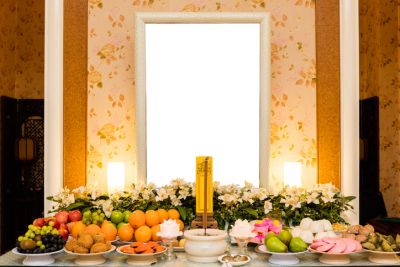 Death is often regarded with equal parts curiosity, awe, and fear, so it’s not surprising that humans have developed complex belief systems and rituals to deal with it. Since it’s sometimes hard to tell whether these either reflect their native cultures or help form them, the question of which came first can be regarded as a “chicken-and-egg” scenario. Along with unique Eastern and South Asian cultural traditions, Buddhist views on life, suffering, death, rebirth, and the purpose of existence can inform funerary practices in a variety of ways.
Death is often regarded with equal parts curiosity, awe, and fear, so it’s not surprising that humans have developed complex belief systems and rituals to deal with it. Since it’s sometimes hard to tell whether these either reflect their native cultures or help form them, the question of which came first can be regarded as a “chicken-and-egg” scenario. Along with unique Eastern and South Asian cultural traditions, Buddhist views on life, suffering, death, rebirth, and the purpose of existence can inform funerary practices in a variety of ways.
Death’s Significance in Buddhist Traditions
BBC Religions defines Buddhism as a spiritual tradition focusing on personal development over a long span of life, death, and rebirth. Nothing is permanent, not even the nature of the self across lifetimes. In fact, the Encyclopedia Britannica explains the concept of “anatta,” or the lack of an unchanging soul or self. Instead, each person’s existence comprises five distinct, constantly mutable factors:
- Rupa, or a physical body
- Vedana, or feelings
- Samjna, one’s perceptions
- Sankhara, mental cogitations
- Vijnana, a person’s consciousness
The end goal for many Buddhists is to exit the samsara cycle of endless death and rebirth. This means eventually achieving “nirvana,” a state described by some as a blissful union with the Divine or by others as complete freedom from torment, suffering, want, and karmic impacts.
Buddhist Funeral Styles Can Vary
Every Buddhist funeral service is shaped by national and regional customs along with specific beliefs from the Buddhist school observed by the deceased. To understand how this works, it’s important to remember that certain sects tend to be more prevalent in each country. For instance, most Indian Buddhists follow the Navayana version while Zen Buddhism, popular in the United States, combines the Indian Mahayana school with Taoist influences from China, Korea, and Japan.
The Buddhist Society discloses that many people hailing from Eastern and South Asian countries have already established connections with religious communities. In these cases, they or their families know clerics who can preside over their memorial services. For individuals who don’t have these cultural connections, they may specify which school they follow when documenting their final wishes, but local Buddhist organizations can often connect their families with religious leaders or funeral directors who can arrange or officiate ceremonies.
Common Elements in Buddhist Memorials
Even so, some universal practices end up in many Buddhist mourning customs. The body is generally left undisturbed from the time the person dies until the remains are cremated or buried. Cremation is characteristically favored by Buddhists, but some believe that it must take place after the person’s essence has finished transitioning out of the body. For this reason, rest periods of three to four days between death and cremation are typical.
Moreover, a few ceremonial elements are common to Buddhist funerals. As Funeralwise divulges, an altar may be erected with a photo of the departed person along with flowers, fruit, incense, candles, and a statue of the Buddha. Monks usually preside, preaching a sermon and leading the mourners in various rituals. Memorials can also include a transfer of merit, described by Oxford Bibliographies as a rite that redirects one’s good karma to benefit the deceased. Along with these practices, attendees may join in chants, ring gongs, and bring offerings of flowers and fruit.
Meaningful Ways to Say “Goodbye”
Buddhist funerary customs can differ widely according to the deceased’s country of origin and sect of Buddhism. Nevertheless, there are some commonalities in the rites observed and the core beliefs that underpin them. While the self isn’t seen as permanent, the memorial service allows loved ones to grieve as well as acknowledge that death is merely the end of one state of existence and the beginning of another.
Add Your Comment